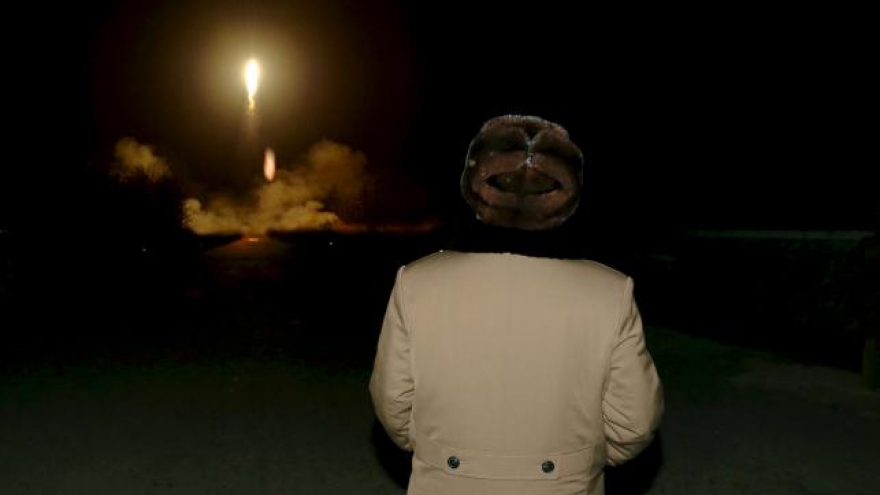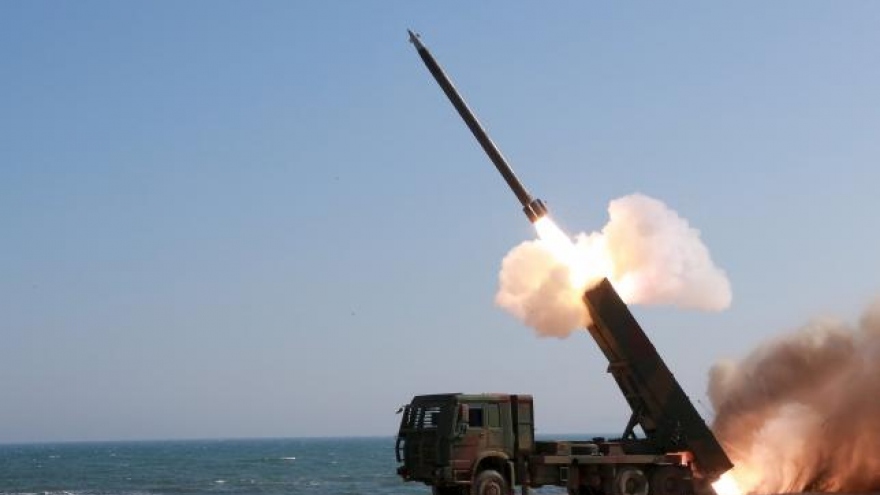US warns of 'other' options if DPRK continues nuclear, missile tests
The United States warned on April 26 it would consider "other" options, which could include new sanctions or security steps, if the Democratic People's Republic of Korea (DPRK) continued nuclear and ballistic missile testing.
 |
It is widely expected to conduct a fifth nuclear test soon, perhaps ahead of a congress of the ruling Workers Party congress in early May.
President Barack Obama said the United States was working on defending itself and its allies against potential threats from North Korea, which he called an "erratic" country with an "irresponsible" leader.
In a CBS interview that aired on April 26, Obama said the United States was spending a lot more time positioning its missile development systems to set up a shield "that can at least block the relatively low-level threats," posed by the DPRK.
U.S. State Department spokesman Mark Toner urged the DPRK to refrain from actions that destabilize the region and said Washington would consider "other" options if Pyongyang continued nuclear and missile testing.
Toner noted that past steps had included sanctions and security measures, but declined to elaborate.
"I think it's pretty clear that as the DPRK continues to make decisions that we believe are counterproductive, that we've got to also continually look at what our options are in terms of response," he told a daily briefing.
Asked what those options were, Toner added: "We don't want to announce anything before it's been fully formed and fully vetted."
The DPRK tested its fourth nuclear bomb on Jan. 6 and launched a long-range rocket on Feb. 7, prompting a significant tightening in United Nations and U.S. sanctions.
It has conducted several missile tests since, including what it said was a submarine-launched ballistic missile on Saturday.
On April 15, DPRK failed to launch what was likely a Musudan, a missile with a range of more than 3,000 km (1,800 miles), meaning that it could, if launched successfully, hit Japan and also, theoretically, the U.S. territory of Guam.
Yonhap quoted an unnamed the RoK government official as saying there were indications DPRK might try to launch another of the missiles, which is not known to have been successfully flight-tested.
The RoK Defence Ministry spokesman Moon Sang-gyun declined to confirm the Yonhap report but said DPRK's military would likely spend some time trying to fix the problem following the failed launch.
DPRK's Foreign Ministry was quoted on April 26 as saying that the country needed a "powerful nuclear deterrence" to counter U.S. hostility and threats. It said "nuclear threat and blackmail" would only prompt it to make "drastic progress in bolstering nuclear attack capabilities," state media said.
White House spokesman Josh Earnest said he could not confirm reports that the DPRK appeared to be preparing for another nuclear test. However, he said Washington would continue to "ramp up the pressure," including working with China, to persuade Pyongyang to curb its nuclear activities.
The DPRK, whose lone ally is China, routinely threatens to destroy the RoK and its major ally, the United States. The two Koreas remain technically at war after their 1950-53 conflict ended in a truce, rather than a peace treaty.
Obama said there "was no easy solution" to the DPRK threat. He said that while the United States "could destroy DPRK with our arsenals," there would not only be humanitarian costs, but also a potential impact on the RoK.
Experts see DPRK's Musudan test as part of an effort to develop an intercontinental ballistic missile that can reach the mainland United States. Obama said it was important to guard against such attacks.
"They are erratic enough, their leader is personally irresponsible enough that we don't want them getting close" to obtaining such weapons, he said.
The April 15 failure was seen as an embarrassing blow for its leader, Kim Jong Un, who has claimed several advances in weapons technology in recent months.
DPRK said its submarine-launched ballistic missile test on April 23 was a "great success" that provided "one more means for powerful nuclear attack".
The RoK on April 26 described the test, which sent a missile travelling about 30 km (18 miles), as a partial success.
Washington and Seoul began talks on possible deployment of a new missile-defence system, the Terminal High Altitude Area Defense (THAAD), after the latest DPRK nuclear and rocket tests.



